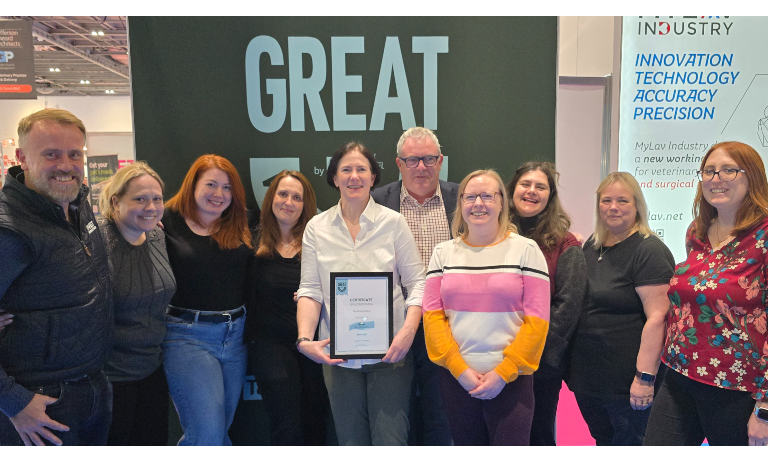


Undertaking accreditation through Great Workplaces by BVA was a smart business choice for The Vet Connection (TVC). With a team of 90 colleagues, it’s a fully remote telehealth triage service, working within this sector for more than 21 years, supporting pet owners with nurse-led advice and veterinary referrals - like how NHS 111 supports human healthcare. Managing Director Nick Irvine, Clinical Director Kirsty Cavill, and Head Veterinary Surgeon Dr Carla Murphy sought an independent assessment of their workplace to enhance culture in October 2024, which resulted in a strengthening of business operations and team culture.
Why The Vet Connection pursued accreditation
The decision to pursue Great Workplaces accreditation was driven by a multitude of factors. When Kirsty took up her new position in 2022, she implemented a strategic initiative towards the continuous improvement of team culture.
Carla, having previously participated in the pilot scheme, saw the tangible impact it had on other veterinary organisations.
“This is something the industry has needed for at least a decade,” she explained. “We were already making internal improvements, and accreditation felt like a natural extension of that journey.”
For Nick, the accreditation offered a commercial advantage. “Having an independent assessment of our business and culture provided us with structured feedback to refine our approach,” he said. “It’s an invaluable process - ignoring it would be a mistake.”
Navigating workplace culture in a remote setting
As a 100% remote organisation, TVC faced a unique challenge: maintaining a cohesive and connected workplace culture without a physical office space.
Nick highlighted this concern, stating, “We’ve always been mindful of whether a remote model could still offer the same team support, collaboration, and sense of belonging. Accreditation reassured us that we had built a strong team culture - but it also challenged us to refine and strengthen it further.”
The Great Workplaces framework provided structured independent feedback, allowing TVC to identify blind spots and address potential weaknesses. “You can think things are working well, but without structured feedback, you don’t always see what’s missing,” Nick added.
How accreditation strengthens the business
For TVC, accreditation was not just about improving workplace culture: it was also about making sound business decisions. Nick emphasised that investing in colleagues directly impacts the company’s success.
“For workplaces that are commercially oriented and hesitant about investing in workplace culture, our story shows that not investing in your colleagues is a mistake,” he said. “We’ve seen firsthand how focusing on colleague welfare and engagement has strengthened our commercial performance.”
Nick noted that veterinary professionals now have a more significant influence on profitability, shifting the business from a revenue-driven model to one that values both financial outcomes and colleague wellbeing. “We used to be very commercially driven, but this process helped us strike a better balance. Now, our colleagues understand how their work impacts the business, and we’re in a stronger commercial position as a result.”
Key takeaways
TVC achieved Gold-level accreditation in four out of five standards within the Health and Wellbeing framework, underscoring its commitment to employee welfare. One of the most impactful insights was the need to improve internal communication, a challenge for any large, remote organisation.
Carla explained, “We’ve made major improvements in communication, but there’s always room for more. The accreditation process showed us that giving the team a clearer vision of the business, including commercial aspects, has helped create a more connected and engaged workforce.”
One of the most significant findings for Nick was uncovering a lingering division between the support team and the veterinary team. “We thought we had moved past a ‘them and us’ culture, but the accreditation feedback showed that some of those perceptions still existed,” he admitted. “It was a tough but necessary realisation.”
As a result, TVC made a simple but effective structural change. They removed labels such as ‘business support team’ and ‘clinical team,’ which unintentionally reinforced divisions, and instead implemented five clear team structures. “It was such a simple change, but incredibly effective,” Nick said. “The response from the team was overwhelmingly positive.”
Advice for other workplaces considering accreditation
For TVC, accreditation was about more than earning a certificate - it was about fostering a workplace where people genuinely want to work.
Nick advised other practices to approach accreditation with the right mindset. “If you’re just in it for a certificate, don’t do it. But if you’re serious about creating a workplace where people thrive, it’s one of the best things you can do.”
Since achieving accreditation, TVC has developed a structured action plan to implement the insights gained. One of their primary focuses is further enhancing communication across the organisation, ensuring that every team member feels valued, informed, and part of the bigger picture.
Kirsty stated "This was a whole team initiative and is only just the start of our journey. As a business we have made an open commitment to the continuous improvement of our workplace culture and the engagement of our team members. After all, a business is only as good as the team behind it. We value our colleagues and want to invest in their future as we continue to develop the business model."
The leadership team at TVC remain focussed and committed to this on-going initiative and look forward to re-accreditation in 2027 where they are striving to achieve gold standard across all areas.
Register your interest
Want to know more about how Great Workplaces can help your team? Register your interest below, and we’ll share more information.
If you have any queries, get in touch: 020 7908 6320 or [email protected]

